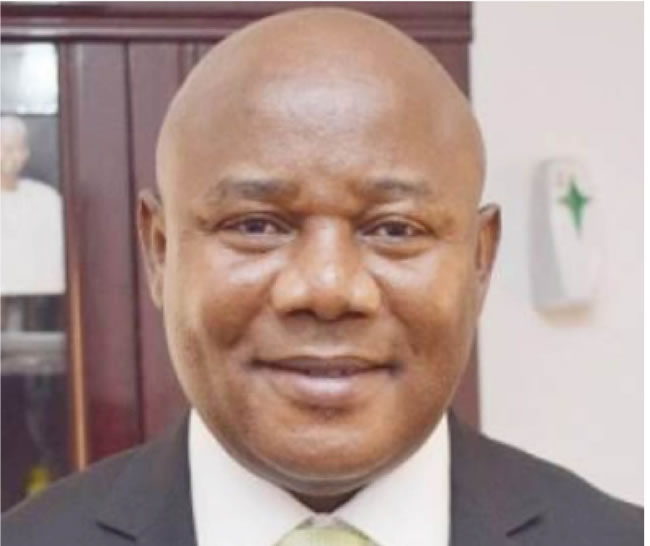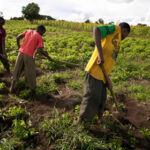Festus Adebayo is the founder of the Housing Development Advocacy Network (HDAN) and convener of the Africa International Housing Show (AIHS).In this interview with DAYO AYEYEMI, the astute advocate of affordable housing in Africa, sheds more light on some of the germane issues that will top agenda as built environment professionals, real estate developers, financiers, CEOs, building materials’ manufacturers and exhibitors converge next week in Abuja.
What is AIHS to housing industry, I mean real estate sector?
African International Housing Show (AIHS) is the largest stakeholders’ platform in Africa. It is that platform that bring professionals from various parts of the world to Africa, to provide solutions to housing problems. It is that place where professionals and stakeholders can equip themselves with the trends in the industry. It is where new knowledge is gained; it is where new business are discovered, where CEOs meet CEOs. It has been described as the largest networking platform. It is the place where the consumers meet the financiers, the developers and the manufacturers of the products they are using for housing. It is that platform where the stakeholders meet those people who are in charge of policies making. It is a place where professionals meet those who are in charge of enforcement of policies. It is a platform where commissioners of housing in different states network. It is that place where the private sector and public sectors interact; a place that has been described as a neutral platform where professionals interact freely. That is the relevance of this platform to housing industry. It is that place that new businesses are grown, where it will be difficult to lose a participant or exhibitor or partner because of the gains that they all have every year.
What has been the impact of the housing show in the last 15 years?
Africa International Housing Show has contributed a lot in the area of policy, making input into the policy of government. It is contributing in the area of asking government one or two things that can make the sector to grow. AIHS has contributed in asking government for a specialised Ministry of Housing in all the states of the federation. We are proud to say today the a good number of states in Nigeria has a specialised ministry of housing. This idea came from AIHS.
For years it has been difficult for Nigerians to have access to Shelter Afrique funding, it was on this platform that the idea of getting loan from Shelter Afrique came from. We know that getting funding in a foreign/ dollar rate is very difficult and risky for the business, so it was from AIHS platform that was agreed that Shelter Afrique should float a Bond in Nigeria for the purpose of making funds available in Naira for estate developers who are in need of funding for their projects.
We are proud to say that, that has been accepted, implemented by Shelter Afrique, and we can report to you that Nigeria’s developers have opportunity to access loans from Shelter Afrique in Naira rate, devoid of any risk of fluctuation. We asked for the use of Pension Fund for housing. We collaborated with the Mortgage Bank Association of Nigeria (MBAN) to make this demand. We are proud to say that this has been answered. MBAN is a proud partner of AIHS, they are there every year and by the grace of God, in this 2023, we shall also look at and appraise the performance of RSA; to know what extent it has been able to penetrate those applying for it or there is problem. These are issues we are trying to listen to in 2023. We demanded for an organisation that can concentrate only in providing also housing and we got that, that is the Family Homes Fund. We demanded for the Mortgage Refinance organisation, also with the support of MBAN, we got it. Today, we have NMRC. We demanded for land information system, well -documented for easy access to land for the development of housing, today we can boast that we now have various information system in all the states of the federation.
What are the issues to address in this year’s AIHS?
Issue of data is bothering the board of AIHS, and on that note we are collaborating with the National Bureau of Statistics. We are involving international agency like Shelter Afrique, Africa Union of Housing Finance, Nigeria Population Commission, Central Bank of Nigeria, all of them are going to be part of this even from Day One. We are going to look for the way forward to get funding for data for real estate. They cannot take decision planning without having the accurate data of how many people need a particular category of housing in Nigeria. This is bothering us. The data solution is very key and is part of what we are going to look into on the Day 1 of AIHS 2023. Apart from that, we shall be looking at the issue of challenges of climate change on affordable housing delivery; we are going to look into funding of green houses. On this, we have got the support of International Finance Corporation (IFC) and it is ready to be part of us. We also have a master class AIHS 2023 which is going to be powered by the University of Lagos’s Centre for Human settlement. Over 36 universities are going to be at the AIHS to participate in this event that will be anchored by the Director of Centre of Human Settlement, Professor Olugbenga Timothy Nubi. All stakeholders in the housing industry are ready, including professional bodies. Issues of Protech are not going to be left out, we are going to look at them. Apart from that, we are going to have a fire question that will involve the estate developers, government’s representatives and financiers, where they are going to have a discussion on issues bordering on land grabbing, building collapse, access to land permit, building approval etc. Finally, we are going to have under 40 professionals’ meet up. These are next generation of real estate leaders. These shall be the focus of AIHS. We have been investing a lot on youth development and capacity building; we have been involved in how they can be united. A young architect can work harmoniously with young town planner. We are going to have a Dangote Day; we are going to look at the issue of building materials, cement especially, and Dangote is going to tell us the agenda to develop housing industry. We have Abuja Property Development Company, they are part of the Platinum sponsors . We are working together and they are also going to tell us the agenda of their company in the area of promoting affordable housing in Nigeria. Finally, we have with us this year REALL, they are into financing low-cost housing. They will be joining us to see how they can have investment in Nigeria and also tell us some of their findings on issue of low-cost housing in Nigeria.
The Federal Government is proposing transfer of N8,000 naira monthly to citizens to cushion the effects of fuel subsidy removal. What is your take?
I am calling on the government to address unemployment and other economic challenges through affordable housing. I am urging the new administration of President Bola Tinubu to provide housing for citizens instead of cash transfers of N8,000 naira monthly being proposed to cushion the effects of fuel subsidy removal.
Nigerian citizens’ needed intervention and not N8,000 cash transfer per month. This is coming at the time when Nigerian citizens are faced with the effect of fuel subsidy removal by the new administration.
There’s no doubt that it’s a new dawn in Nigeria, and Nigerians are experiencing a new era. But the question is how far they can adjust to the effect of fuel subsidy removal? I believe only time can tell. I must say that the multiplier effect of fuel subsidy removal can be seen in all aspects of the economy, because when fuel price increases, everything increases, look at transportation, food, building materials and so on.
I must use this opportunity to let you know that the palliative Nigerians need shouldn’t be in cash transfer of N8,000 but intervention that will empower them to become productive and ease the effect of fuel subsidy removal.
What is expected at this time is for the government to intervene through palliative so as to enable citizens to cope with the economic effect of fuel subsidy removal especially at a time like this when affordable housing is almost a mirage. Even when there was no fuel subsidy removal, delivering affordable housing has been a herculean task for the government which even has quick access to land, more or less than individuals and organisations.
The 17th edition of the Africa International Housing Show will provide a platform where the Federal government will speak on how it intends to address the issue of affordable housing for Nigerians as a reality. Citizens need housing to improve productivity, be in good health, job creation, amongst others. The government must announce its intervention plan for housing now before it’s too late.
What has been your biggest challenge organising this show?
We are still facing the challenges of land grabbing, corruption and lack of political will on the part of the government to reform the mortgage system. But we are not giving up; we have set up advocacy platforms to advance policy ideas. We have made our position known on the merger of some agencies in the housing sector and what we want in the area of mortgage. Housing must be given the desired attention.
As of today, the contribution of housing to the national Gross Domestic Product (GDP) is about 5.3 percent and it is the fifth contributor to the GDP. All over the world, the position of housing is very key in creating jobs.Some stakeholders in the real state sector say the idea of affordable housing is not realistic; especially in Nigeria where inflationary trends and importation of building materials make housing expensive. We have developers saying they are building affordable housing but when you ask the price, they say N54 or N59 million. Government must have a way to intervene so that citizens can have social housing and what you call affordable housing. Government can intervene through infrastructure.Beyond that, government can create a land bank, where it can do site and services. Government must show the political will to drive the Nigerian housing sector. Between January and now, the Egyptian government has delivered 15, 000 houses. I was at the World Bank for a meeting on affordable housing and I was angry at the venue because we were coming up with beautiful ideas but who will implement them.
READ ALSO FROM NIGERIAN TRIBUNE






